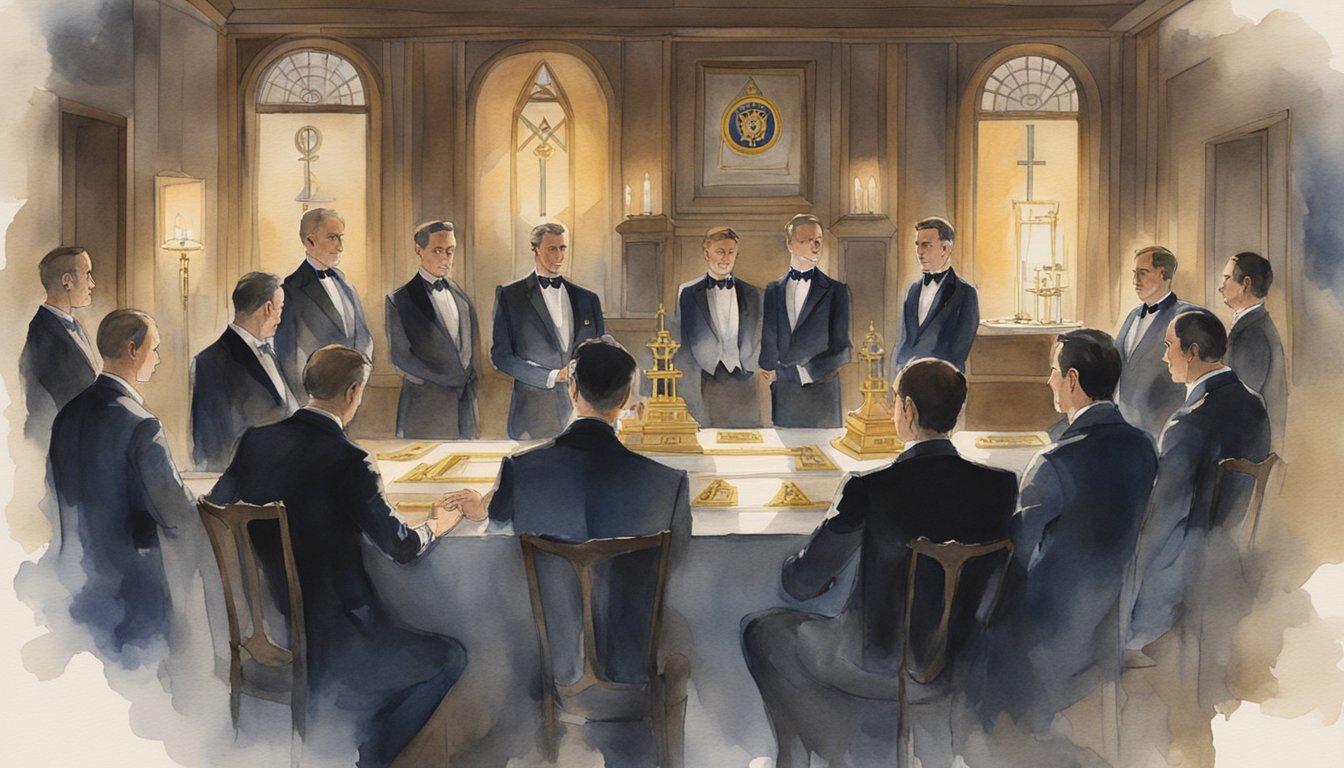Freemasonry Defined
Freemasonry is a historic fraternity known for its long-standing traditions, complex rituals, and significant influence across various societies. It boasts a worldwide fraternity that champions moral and spiritual values, uniting members from diverse backgrounds.
Origins and History
Freemasonry traces its Origins and History to the guilds of stonemasons of the Middle Ages, particularly in England. The craft evolved from operative masonry to speculative with the inclusion of those not physically involved in stonework, leading to modern Freemasonry. The Regius Poem, dating back to roughly 1390, also known as the Halliwell Manuscript, is the earliest document referring to mason’s craft. The formal organization began with the founding of the first Grand Lodge in London in 1717.
Modern Structure and Membership
The Modern Structure and Membership of Masonic lodges can vary, but most adhere to the principles set by the United Grand Lodge of England – with similar bodies governing in North America and elsewhere. Generally, membership is restricted to men, although co-masonic and women’s lodges also exist. Organisations such as the Order of the Eastern Star and Prince Hall Freemasonry provide avenues for broader membership, but these are considered separate entities associated with the main branch of Freemasonry, known as Free and Accepted Masons.
Symbols and Rites
Freemasonry is rich with Symbols and Rites, many of which stem from the tools and practices of actual stonemasons. Symbols like the square and compasses are iconic, representing moral and ethical frameworks. The initiation process consists of three primary degrees: Entered Apprentice, Fellowcraft, and Master Mason, each with their own specific rituals, passwords, and signs. Beyond these, there are additional higher degrees offered in appendant orders.
Beliefs and Values
At its core, the Beliefs and Values promoted by Freemasonry center on moral uprightness, aid to fellow members, and improvement of society. While not a religion, members must believe in a supreme being, though the fraternity is open to men of various religious faiths. Historic tensions with the Catholic Church arise from the perception of Freemasonry as a secret society and its deistic religious stance that diverged from orthodox Christianity, leading to a ban from the Vatican on Catholics joining the order.
Cultural Impact and Notable Freemasons
Freemasonry has had a considerable Cultural Impact, with many Notable Freemasons throughout history, including leaders and influential figures like George Washington, Wolfgang Amadeus Mozart, and Benjamin Franklin. Freemasonry’s concepts have permeated into broader culture, inspiring organizations such as the Knights Templar and giving rise to speculative theories about connections to groups like the Illuminati. Numerous U.S. presidents have been Freemasons, highlighting the order’s influence in American history. Freemasonry also played an intellectual role during the Enlightenment, fostering philosophical exchanges and progressive ideas.
What Do Stacked Rocks Reveal About Freemason Symbolism?
Stacked rocks, known as cairns, serve as markers and symbols throughout history. In Freemason traditions, they embody strength and resilience. Understanding the symbolism of cairns enhances our appreciation for their role in guiding travelers and signifying a journey, reflecting the deeper connections of life and enlightenment within Masonic philosophy.
Freemasonry and Society

Freemasonry has been a notable social institution throughout its history, influencing social dynamics and contributing to community services while also facing its share of controversies and opposition.
Political and Social Dynamics
Freemasonry has a storied connection to various political movements and has been considered an instrument of the Enlightenment that advocated rational thought and egalitarian principles. Members known as Freemasons are linked to several historical political figures who played roles in government and the shaping of state policies. In the United States, the Anti-Masonic Party became the first third party in American politics, reflecting the tension between the fraternity and certain political segments of the era.
Public Perceptions and Controversy
Public opinion of Freemasonry has been mixed, with the organization often at the center of various conspiracy theories. The air of secrecy and historical connection to influential societal figures has fed into narratives of shadowy control. Despite this, Freemasons insist their activities are benevolent and misunderstood. Opposition from entities like the Catholic Church, which has periodically expressed reservations about the fraternity’s secrecy and perceived conflicts with Catholic doctrine, reflects such misunderstandings and fuels ongoing debate about the order’s role in society.
Freemasonry’s Contributions and Outreach
The charitable work of Freemasonry is extensive, including significant donations to educational causes, healthcare, and disaster relief. Through organizations such as the Freemason’s Grand Lodges and affiliated bodies like The Order of the Eastern Star, Freemasons engage in philanthropic outreach, addressing societal needs across various communities, including support for fellow members and their families during times of hardship.
Challenges and Evolution
Challenges to modern Freemasonry include declining membership, especially among younger demographics, which poses questions about the fraternity’s future. Nonetheless, Freemasonry continues to evolve, with many lodges now actively working to shed their secretive image, embracing social media and public events to demystify their practices and appeal to the next generation. Freemasonry reflects the change and adaptation of social institutions to new eras of thought, maintaining the traditions of fellowship and craft while navigating the modern landscape of sociability and morality.
Discover a comprehensive history of Freemasonry and its influences, explore the complex and often misunderstood public perceptions, and learn about the fraternity’s notable charitable work.

